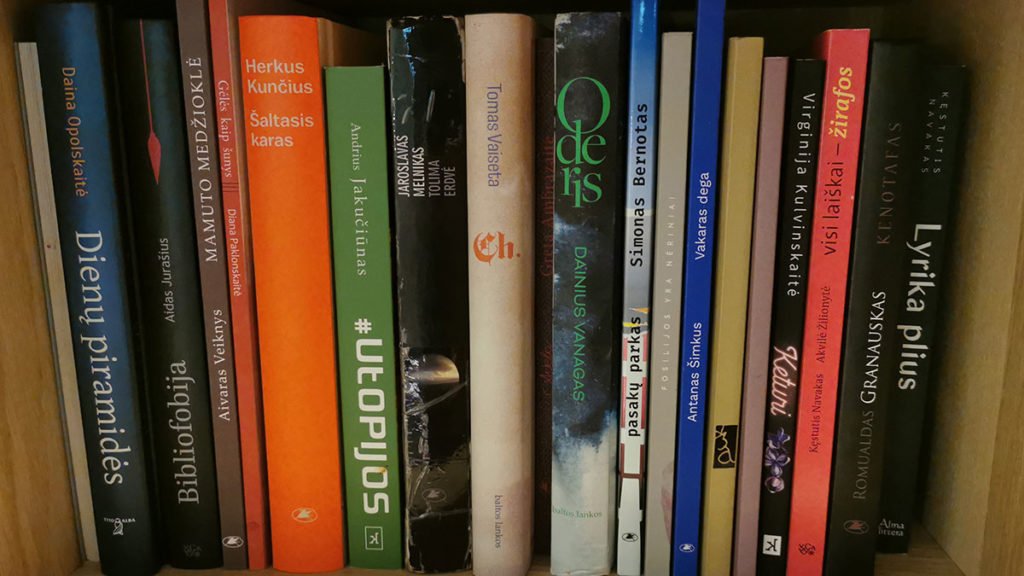

Lina Buividavičiūtė
Lina Buividavičiūtė was born on May 14, 1986. She is a poet and literary critic. Lina is an author of two poetry books in Lithuanian language. Her poetry has been published in most of Lithuania’s cultural periodicals and foreign magazines. She has actively taken part in literary readings, book launches, and contests.
The aim of this article is to represent the scene of contemporary Lithuanian literature and to identify most important aspects and tendencies of Lithuanian poetry. Firstly, it’s important to mention that impactful changes began from the restoration of Independence in 1990. It marks important epistemic change and move to the world – many global contexts including art and literature became more accessible and understandable. The task of Independent Lithuanian literature was to uphold uniqueness and national identity, and to connect it with international tendencies and contexts. The last two decades show that this task was implemented quite successfully and creatively.
Contemporary Lithuanian poetry
Effort to describe contemporary Lithuanian poetry is challenging because of variety of different styles and themes. However, some tendencies are clear and can be defined. Contemporary Lithuanian poetry varies from modern classic to confessional poetry and postmodern playfulness. For example, Antanas Jonynas (b.1953) uses old, classic genre (sonnet) and fills it with fresh and modern interpretations. Aivaras Veiknys (b. 1983) also leans on tradition and obviously finds inspiration in it. On the other hand, this poet seeks an original, personal interpretation of universal modes and archetypes. Gytis Norvilas (b.1976) emphasises the importance of language and concept of organic writing. Norvilas’s fourth book, Grimzdimas (Sinking) can be called poetry of spatialization. In last decade or two, confessional poetry became important and gained a lot of attention. It varies from wounded femininity to wounded masculinity. For example, Giedrė Kazlauskaitė (b.1980) “analyses the relevant inner dramas and comedies of a female writer, mother, homosexual woman and young researcher <…> Avoiding the self-pity that’s typical to Lithuanian poetry, she uses plenty of cultural references, literary allusions and irony” (Virginija Cibarauskė, Contemporary Lithuanian poetry and its contexts, Poetry – Lithuanian Culture Institute). Dark side of women psychology and physiology is described in Vitalija Pilipauskaitė’s-Butkienė’s (b.1981) poetry. Unconventional masculinity is interpreted in Ramūnas Liutkevičius’s (b.1982) poetry debut book Šokis įsuka šviesą (The Dance Turns in the Light), which “deals with themes of addiction, emotional health, and sexuality” (Neringa Butnoriūtė, Debuts in poetry that reach for the light, Debuts in Poetry that Reach for the Light – Vilnius Review). Mantas Balakauskas (b.1889) provides an alternative for conformist lifestyle and capitalist dream in his second poetry book Apmaudas (Vexation). Greta Ambrazaitė (b.1993), Marija Mažulė (b.1985) and Kristina Tamulevičiūtė (b.1989) emphasise the importance of family history, transgenerational traumas and opportunities of healing in their poetry. Postmodern aesthetic, playfulness and intertextuality are identified in Simonas Bernotas’s (b. 1993) poetry.
Social contexts of contemporary Lithuanian literature
It’s necessary to emphasise that contemporary Lithuanian literature is seen and recognized in the world more and more widely. Some cultural institutions play an important role in presenting Lithuanian literature on the world scene. One of them is the Lithuanian Culture Institute operating from 2008. The Institute organises and coordinates programmes presenting Lithuanian culture abroad and runs the Translation Grant Programme. Many important and interesting articles about contemporary Lithuanian literature can be found on an internet page of the Institute: Lithuanian Culture Institute – LCI. Online magazine “Vilnius review” presents Lithuanian literature in translation. “Vilnius Review” presents extracts from the latest novels, poems and short stories from the latest collections, and essays and excerpts from the most interesting Lithuanian non-fiction works. Magazine also publishes interviews with prominent Lithuanian writers, book reviews, articles about Lithuanian literature, and related audio and video material (About – Vilnius Review). It is highly recommended for everyone who wants to know Lithuanian literature better.
The International Vilnius Book Fair is one of the most important cultural events in Lithuania usually held each February. It is the largest annual book fair in the Baltic countries which attracts many Lithuanian authors and readers as well as famous foreign writers. It attracts over 65 000 visitors each year. Ambitious and colourful programme comprises of meetings with writers, book launches, discussions, film screenings, concerts, exhibitions, creative workshops, and other cultural activities. (About Vilnius Book Fair – Lithuanian Culture Institute). Some important literature prizes are awarded during the International Vilnius Book Fair, and nominees of the Book of the Year award are announced during a special ceremony. The Book of the Year award draws a lot of attention because all readers can give their votes after a professional committee announces 5 best books in different categories. The Institute of Lithuanian Literature and Folklore presents twelve most creative books of the year, and the winning book is announced as well.
There are two important poetry festivals held annually in Lithuania – Poezijos pavasaris (Poetry spring) and Poetinis Druskininkų ruduo (the Druskininkai Poetic Fall). Poetry spring has been held since 1965 and seeks for modern ways to present and promote contemporary Lithuanian poetry now. The festival provides opportunities for poets to meet their readers not only in the capital city of Vilnius or other big cities but in small towns as well. Many poetry awards are given out during Poetry spring including The Maironis award. The Druskininkai Poetic Fall was launched in 1990 and takes place in Vilnius and Druskininkai. This festival is a good opportunity to celebrate the diversity of the Lithuanian poetic community. The winners of the Jotvingiai and Young Jotvingis awards are announced during the festival. Both poetry festivals feature Lithuanian poetry, and contemporary poets from all over the world are invited as well.
To sum up, the scene of contemporary Lithuanian literature is dynamic, intense, and worth literature critics and readers attention.